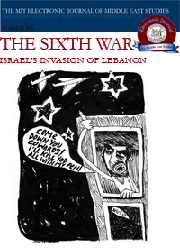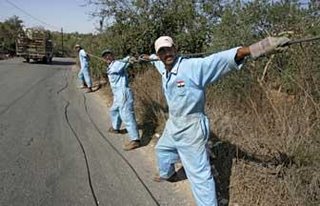Gideon Levy has written a brilliant piece in Haáretz today about the American lack of will to achieve peace and democracy in the region, contrary to their stated aims, the article was appearently triggered by the latest futile roundtrip to the region by Condi.
I intended to write somethinhg on her latest trip myself, focusing on Egypt, but apart from the fact that this time was slightly different from the past trips in rhetoric, nothing new in terms of substance came out(the fact that Egypt will pursue nuclear energy for peaceful purposes, and the endorsement and friendly helpfullness to provide what ever Egypt needs for that purpose was predictable.This will probably make Egypt less eager to talk about Dimona as well. The fact that Iran also has the right to pursue the goal of peaceful nuclear energy, has nothing to do with it..
Ayman Nour was not mentioned this time, perhaps some kind of silent diplomacy? (nobody else either, but that dosen´t surprise anyone anymore). Democracy promotion was finaly put to rest in the mastaba of useful flowery rhetoric in pursuit of strategic intersts. Only a mastaba was built as a way of ensuring a good afterlife, the current administration seem to have a somewhat shorter lifespan in mind, the midterm elections.
So enough of my own rhetoric, and back to the truth of the matter about the
mystery of America with the master Gideon Levy:
1/Why does America not try to advance a solution towards peace?
¨Rice has been here six times in the course of a year and a half, and what has come of it? Has anyone asked her about this? Does she ask herself?
It is hard to understand how the secretary of state allows herself to be so humiliated. It is even harder to understand how the superpower she represents allows itself to act in such a hollow and useless way.
The mystery of America remains unsolved: How is it that the United States is doing nothing to advance a solution to the most dangerous and lengthiest conflict in our world? How is it that the world's only superpower, which has the power to quickly facilitate a solution, does not lift a finger to promote it?¨Countless trips by presidents and secretaries of state, peace initiatives and peace plans aplenty, from the Roger's Plan to the Road Map, via "reassessment," fruitless talks and flowery declarations, pressure and promises, discussions and decisions - and nothing has happened.
And in the background, a fundamental question echoes, without a response: Is America at all interested in bringing about a solution in the Middle East? Is it possible that it does not understand how crucial it is to end the conflict?
As things appear, America can and does not want to. No government in Israel, and surely not the most recent ones, which are terrified of the American administration, would stand up to a firm American demand to bring the occupation to an end.
But there has never been an American president who wanted to put an end to the occupation. Does America not understand that without ending the occupation there will be no peace? Peace in the region would deliver a greater blow to world terrorism than any war America has pursued, in Iraq or Afghanistan. Does America not understand this? Can all this be attributed to the omnipotent Jewish lobby, which causes Israel more harm than good?
On Democracy promotion:
The declared aim of U.S. policy in the Middle East is to bring democracy to the region. For this reason, ostensibly, the U.S. also went to war in Iraq. Even if one ignores the hypocrisy, self-righteousness and double-standard of the Bush administration, which supports quite a few despotic regimes,
one should ask the great seeker of democracy: Have your eyes failed to see that the most undemocratic and brutal regime in the region is the Israeli occupation in the territories? And how does the White House reconcile the contradiction between the aspiration to instill democracy in the peoples of the region and the boycott of the Hamas government, which was chosen in democratic elections as America wanted and preached?The U.S. also speaks loftily about peace. At the same time, its president warns Israel against any attempt to forge peace with Syria. Here America is taking a stance that not only fails to advance an accord but even undermines it. Ever since it began to give Israel a free hand to impose the brutal occupation in the territories, it has become a party that bequeaths undemocratic values to the entire world. Where are the days when there was still concern in Jerusalem about the U.S. reaction before each military operation? Israel then thought twice before every liquidation and each arrest. Every demolition of a Palestinian home and each nocturnal groundbreaking of a settlement raised fears about how Uncle Sam would react. And now - carte blanche. There is a blank check for every belligerent action by Israel. Should this also be called an effort for peace, for democracy?
He ends like this:
n the Middle East, the U.S. has an opportunity to fundamentally change its image, from a warmonger to a peacemaker. And how does the U.S. respond to the challenge? It sends Rice to tell the excited Ehud Olmert how she falls asleep easily on her unnecessary and ridiculous flights to and from the Middle East.
It seems that Levy and
Rami Khouri has been spending some time chatting about Condis inflight litterature and sleep back and forth, in this endless charade of diplomatic nonsense.
I could perhaps end by adding a question or two myself:
1/ Why didn´t the American administration boycott the Netanyahu government prior to tyhe Wye-agreement, altough Netanyahu wanted to renegotiate pretty much everything agreed upon in Oslo? As i recall, Wye river was portrayed as a major achievement at the time, largely because it was the first agreement signed by a likud dominated government which gave some concessions to the Palestineans on the West Bank.
But Wye river is also remembered as the comeback meeting of Arik Sharon, then newly appointed Minister for Foreign Affairs and the goodbye from the political scene by a fragile and pale King Hussein, rushed from the Mayo cancer clinic in Rochester Minnesota to salvage the deal at the last minute.
2/ Why didn´t the American administration boycott Sharon when he imadiately tried to kill the road map, by having no less than 14 reservations to the plan?
3/Why don´t the Americans take the Beirut initiative by the Arab League seriously, or at least call their bluff if that´s the case?
4/Why don´t the Arabs take their Beirut initiative seriously?
And finaly - as a tribute to the late President Sadat, days after the 25th aniversary of his death. How come that almost 29 years after Sadat´s plane touched down on the tarmac of Ben Gurion airport, the core issue of Palestine-Israeli peace is not solved?
Of course the Camp David Accords was only implemented as a bilateral agreement, the other part, while talking about UN-resolutions 242 and 338, it also talks about autonomy for the Palestinian people. Sadat in my view, did what he thought best for his people. That he betrayed the palestinians in the process was a fact that he either didn´t think of as a possible outcome, or didn´t care about.
That Egypt was unable to capitalize in any way economically from the peace agreement is largely the fault of the political establishment. The fact that the Egyptian people 29 years later on dosen´t have to think about their sons comming home in coffins is in no small way due to the late President Sadat.
Today, when everybody knows that a sollution is somewhere along the lines of the Oslo, Geneva , Clinton-Taba, Road map or indeed the Beirut initiative, why then must the peoples of the Middle East have to wait a single day more?
American mideast policy, american foreign policy, Condi Rice, Bush administration, Wye River, Road map, Israel, Democracy promotion, peace in the middle east, Anwar Sadat











